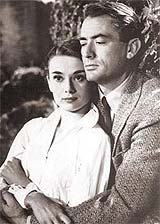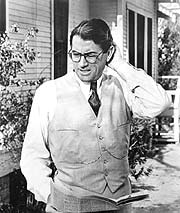|
Oscar Winner Gregory Peck Dies at 87
 |
| Actor
Gregory Peck (news) (L) appears with actress Audrey Hepburn
(news) in a scene from the 1953 film 'Roman Holiday,' in this
undated photograph. |
Gregory Peck, who embodied saintly fatherhood in "To Kill
a Mockingbird" and played a range of real-life figures from
Abraham Lincoln to Josef Mengele, died Thursday at 87.
With his wife of 48 years, Veronique, at his side, Peck died about
4 a.m. at his Los Angeles home, spokesman Monroe Friedman said.
Though he played a handful of villains, including the Nazi doctor
Mengele in "The Boys From Brazil," Peck was best known
for upright, chivalrous characters in such films as "Roman
Holiday" and "Gentleman's Agreement" or stalwart
heroes in "Captain Horatio Hornblower" and "Pork
Chop Hill."
Nominated for Academy Awards four times early in his career, Peck
finally won the best-actor honor with his fifth and final nomination
for "To Kill a Mockingbird." The 1962 classic was based
on Harper Lee's novel about widowed lawyer Atticus Finch, who is
raising two children amid Southern racial unrest as he defends a
black man wrongly accused of raping a white woman.
"Gregory Peck was unique. He represents integrity, compassion
and honesty. His star shone brightly for a long time, and now it
will continue to shine in heaven," said Kirk Douglas. "We
talked so often about doing a picture together, and I am sad that
we never got to do one."
Peck's "legacy not only lies in his films, but in the dignified,
decent and moral way in which he worked and lived," said Steven
Spielberg. "He was the reigning father of the actor."
 |
| Actor
Gregory Peck appears as the character Atticus Finch in a scene
from the 1962 film 'To Kill a Mockingbird.' |
Finch earned Peck his final Hollywood honor, placing No. 1 last
week on the American Film Institute's list of top 50 heroes in U.S.
movies.
"I put everything I had into it - all my feelings and everything
I'd learned in 46 years of living, about family life and fathers
and children," Peck said in 1989, recalling the role. "And
my feelings about racial justice and inequality and opportunity."
Spokesman Friedman said Peck had not been suffering from any particular
ailments. Friedman said Peck's wife told him she held his hand as
the actor slipped off to sleep and died.
"He had just been getting older and more fragile," Friedman
said. "He just sort of ran his course and died of old
age."
Off-screen as well as on, Peck conveyed a quiet dignity. He had
one amicable divorce, and scandal never touched him. He served as
president of the Academy of Motion Picture Arts & Sciences and
was active in the Motion Picture and Television Fund, American Cancer
Society, National Endowment for the Arts and other causes.
"He was more than a great man. He was a complete and total
gentleman," said Polly Bergen, who played Peck's wife in the
1962 thriller "Cape Fear." "One of the dearest I've
worked with. He taught me chess between scenes."
Peck's lanky, gaunt-cheeked good looks, measured speech and courtly
demeanor quickly established him as star material in the 1940s.
He made his film debut in 1944's "Days of Glory," a tale
of Russian peasants coping with Nazi occupation. The next year,
Peck played a priest in his second film, "Keys to the Kingdom,"
which brought him his first Oscar nomination.
Three more nominations soon followed: for 1946's "The Yearling,"
the family classic about a boy and his pet fawn; for 1947's best-picture
winner "Gentleman's Agreement," in which Peck played a
reporter posing as a Jew to expose anti-Semitism in America; and
for 1949's "Twelve O'Clock High," with Peck as a World
War II flight leader coming unglued under the pressures of command.
Other films included Alfred Hitchcock's "Spellbound,"
the Ernest Hemingway adaptation "The Snows of Kilimanjaro,"
the corporate-America critique "The Man in the Grey Flannel
Suit" and the nuclear-Armageddon tale "On the Beach."
Peck played Gen. Douglas MacArthur in "MacArthur," Lincoln
in the TV miniseries "The Blue and the Grey" and F. Scott
Fitzgerald in "Beloved Infidel."
Roles became scarce late in his career. He played writer Ambrose
Bierce in 1989's "Old Gringo" and the owner of a company
targeted for a hostile takeover in the 1991 Danny DeVito comedy
"Other People's Money."
"It was an honor to know him. It was an honor to have worked
with him," DeVito said. "He was gentle, sweet and generous."
Among Peck's final roles were playful revisitations of his past
films. In the 1998 TV miniseries "Moby Dick," Peck had
a small part as a fire-and-brimstone preacher, a role Orson Welles
played in the 1956 movie version in which Peck starred as Capt.
Ahab.
Martin Scorsese's 1991 remake of "Cape Fear" cast Peck
and Robert Mitchum in a reversal of the good and evil types they
played in the 1962 original. Mitchum, the vengeful ex-con who terrorized
Peck and his family in the original, played a sympathetic policeman
in the new version, while Peck played the ex-con's vile lawyer in
the remake.
Born Eldred Gregory Peck on April 5, 1916, in La Jolla, Calif.,
Peck had a disjointed childhood after his parents divorced when
he was 6. He was shuffled back and forth between them for two years,
lived two more years with his maternal grandmother, then was sent
at age 10 to a Roman Catholic military school in Los Angeles.
An English major at the University of California, Berkeley, Peck
was lured into acting when the director of the campus little theater
accosted him and said he needed a tall actor for a stage version
of "Moby Dick."
Peck appeared in five more plays his last year at college, then
went to New York City, where he studied with Sanford Meisner and
Martha Graham, did summer stock and made his Broadway debut with
the lead in Emlyn Williams' "Morning Star."
After his first few films, Peck was soon under non-exclusive contracts
to four studios; he refused an exclusive pact with MGM despite Louis
B. Mayer's tearful pleading. With most male stars absent in the
war, the studios desperately needed strong leading men. Peck was
exempt from service because of an old back injury.
A Roosevelt New Dealer, Peck campaigned for Harry Truman in 1948
"at a time when nobody thought he had a chance to win."
He continued championing liberal causes, producing an anti-Vietnam
War film in 1972, "The Trial of the Catonsville Nine"
and helping the campaign against the nomination of Robert Bork to
the Supreme Court in 1987.
Peck married his first wife, Greta, in 1942 and they had three
sons, Jonathan, Stephen and Carey. Jonathan, a TV reporter, committed
suicide at age 30. After his divorce in 1954, Peck married Veronique
Passani, a Paris reporter. They had two children, Anthony and Cecilia,
both actors.
|
